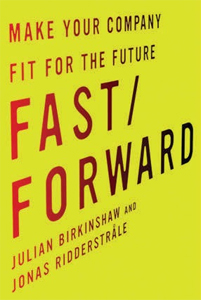To Succeed In An AI World, Focus On Your Human Qualities
By Julian Birkinshaw
 How is artificial intelligence (AI) changing the way we work in organizations? It is already being used to automate processes (e.g., updating databases) and to provide cost-saving insights (e.g., in credit card fraud), and it is gradually encroaching on many traditionally human activities, from driving a car to answering the phone. By harnessing AI technology, we can improve productivity and free up our time to do more interesting, more value-added work.
How is artificial intelligence (AI) changing the way we work in organizations? It is already being used to automate processes (e.g., updating databases) and to provide cost-saving insights (e.g., in credit card fraud), and it is gradually encroaching on many traditionally human activities, from driving a car to answering the phone. By harnessing AI technology, we can improve productivity and free up our time to do more interesting, more value-added work.
There is a dark side as well. Concerns abound about AI destroying jobs and super-intelligent computers going rogue. But there are more immediate concerns as well. AI decision-making is only as good as the body of data it is learning from. It has a very narrow form of intelligence, which makes it oblivious to context. AI facilitates extreme levels of control. For example, call center workers are fed lines by the computer according to what the customer is saying, and their every utterance is monitored. Firms are experimenting with “smart contracts” which are executed automatically after certain conditions have been met. In its extreme form, an AI-enabled firm might be super smart but entirely sterile.
So, what should you do to get the most out of these new AI technologies? Back in 1982, the futurist John Naisbitt coined the term “high tech/high touch.” He said that whenever a new technology is introduced, there must be a counterbalancing human response, or the technology is rejected; we need to maintain a balance between the material wonders of technology and human spirituality. What does this mean in practice? It suggests the firms that succeed in the future will be the ones that capitalize on their uniquely human qualities, while also harnessing the latest advances in AI technology. For example:
A premium on intuitive judgment — Important decisions always will be backed up with detailed analysis, risk assessments, and net present value (NPV) calculations, all made easier by the latest advances in technology. But don’t kid yourself that this algorithm-based analysis will give you the answer. Executives are paid to exercise judgment, and that means sometimes using prior experience, intuition, or gut feel to reach your own conclusion.
Human creativity and contrarianism — AI has been used to write musical scores and paint works of art, but this is all creativity within a frame. If you want a truly creative leap, you need human intervention. Think about all the big innovations in drug development or healthcare — their stories involve improbable insights, serendipitous events, and stubborn and contrarian inventors. As the Financial Times once said, “When it comes to investing, human stupidity beats AI.”
 Importance of the personal touch — No computer has yet come close to mastering casual conversation (the famous Turing Test). This is good news for businesses built on personal relationships, from nursing to financial advice. But keep this in mind if you are wondering how much to invest in technology. In retail banking, most big players are closing branches and pushing customers onto mobile apps, but some of the fastest-growing banks are doing the exact opposite (e.g., Handelsbanken in Sweden and Capitec in South Africa).
Importance of the personal touch — No computer has yet come close to mastering casual conversation (the famous Turing Test). This is good news for businesses built on personal relationships, from nursing to financial advice. But keep this in mind if you are wondering how much to invest in technology. In retail banking, most big players are closing branches and pushing customers onto mobile apps, but some of the fastest-growing banks are doing the exact opposite (e.g., Handelsbanken in Sweden and Capitec in South Africa).
In sum, to succeed in an AI world you need to keep technology in its place — as servant not master — and emphasize your distinctively human qualities, such as intuitive judgment, creativity, and personal relationships. These are the attributes that will make your company fit for the future.
JULIAN BIRKINSHAW is a professor and deputy dean at the London Business School. His recent book, co-authored with Jonas Ridderstrale, is Fast/Forward: Make Your Company Fit For The Future.
